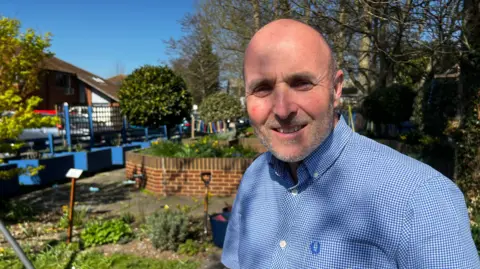Dave Harvey
Business and Environment Correspondent, BBC West

 BBC
BBC
Katryn Bennett says she faces a £35,000 increase in National Insurance costs
Charities and childcare nurseries say they are furious that they face increases in their National Insurance bills, but are also powerless to raise their incomes.
From 6 April almost all employers will pay higher National Insurance Contributions (NICs) for staff, something the government says is necessary to fund public services.
But charities and some nurseries say that, unlike businesses, they cannot increase their prices.
"It's totally unfair" said Katryn Bennett, who owns a children's nursery.
She added: "If this treatment continues, people like myself will quit".
The government insisted it has taken "the necessary decisions on tax to stabilise the public finances".
When I dropped in on the Acorn Day Nursery in Somerton, Somerset, it was hairdressing time.
"How would madam like her hair today?" teased Mrs Bennett, combing the hair of one of her four-year-old charges.
What does National Insurance pay for?She started the nursery 26 years ago, but is now worrying she may have to close.
"I don't want to do that to the families, the community that we love, but what we do?" she said.
"We're dictated to. We're left with no option."


The childcare is paid for by government vouchers, which have not increased to pay for the extra costs of NICs
Like many businesses, her nursery faces a big increase in NICs. With 21 staff it will cost her about £35,000 more a year.
But unlike regular firms, she can do little about it in terms of cuts. Her staff numbers are set by child protection laws, keeping the ratio of workers to children fixed.
"And we are not allowed to increase our prices," Mrs Bennett added.
All of the families whose children come to Acorn use government vouchers, for what ministers call "free childcare".
Parents pay small supplements for some food and items like art supplies.
But although one arm of government has increased Mrs Bennett's costs substantially, the other arm has not raised the voucher payments.
"I think it's totally unfair, totally unjust, what are we supposed to do?" she said.
We asked the government why there was this imbalance.
A spokesperson for HM Treasury said it "will only provide support for [government] departments and other public sector employers for additional National Insurance costs".
Private companies contracted by the government, they confirmed, are not exempt from NIC increases and will be given no specific support.
This means, for example, that NHS hospitals will get help but not hospices.


Therapists at Brainwave help young children with additional needs, but will also be hit by National Insurance increases
For charities, the position is even worse. National Insurance, after all, is not just a tax on businesses but on all employers.
Keith Sinclair runs Brainwave, a specialist charity in Bridgwater helping young children with disabilities and additional needs.
"We have to find another £72,000 a year, and we're unable to pass those costs on to the people we support," he said.
His charity's whole existence is based on not charging people who use their services, yet the NIC increase hits Brainwave just as hard as any private business.
Mr Sinclair already has to raise £2m a year in donations, now he needs to find donors willing to pay his increased tax bill.


Keith Sinclair said he is "angry" that his charity now has to raise another £72,000
During my visit I watched as a young child with learning difficulties was gently coached to walk around a therapy room.
Later, a speech therapist played bubble games with him, apparently just for fun. But gradually he made sign language signals for "more" and "again".
The work of this charity is increasingly in demand, as services within the NHS are harder to find for parents with disabled children. Yet now the government is increasing their costs,
Mr Sinclair said: "I feel angry about it, because we all know that health and social care is on its knees and we are increasingly picking up the slack, and then we are faced with increasing costs to do that."
We asked the Treasury to comment on these cases.
A spokesperson said: "We support our charities through a world-leading tax regime which provided £6bn in relief for the sector last year alone, including exemptions from paying business rates."

 Movie
Movie 3 months ago
98
3 months ago
98 






![Presidents Day Weekend Car Sales [2021 Edition] Presidents Day Weekend Car Sales [2021 Edition]](https://www.findthebestcarprice.com/wp-content/uploads/Presidents-Day-Weekend-car-sales.jpg)



 English (United States)
English (United States)